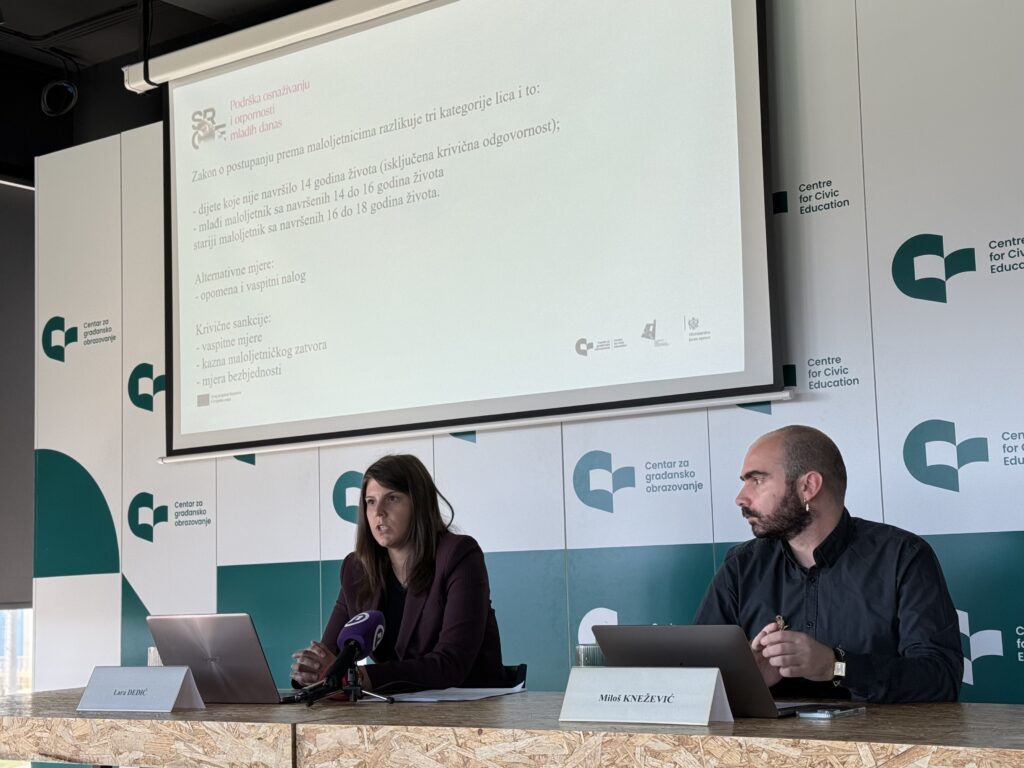Striking the rights balance between protecting society and safeguarding the rights of minors is essential in ensuring their full reintegration, resocialization, and development of their full potential within the community. Only through a coordinated and professional approach of judicial and social institutions can the law become a real tool for preventing criminal behaviour and supporting at-risk youth, it was stated at today’s presentation of the analysis “Youth Before the Law – Challenges and Solutions of Juvenile Justice in Montenegro“, prepared by the Centre for Civic Education (CCE), within the project “HEART: Supporting the Empowerment and Resilience of Youth Today”, financially supported by the European Union with co-financing from the Ministry of Public Administration.
The analysis, authored by lawyer Lara Dedić, provides an in-depth insight into the state of juvenile justice, with an emphasis on obstacles in the implementation of the legal framework and the protection of the rights of children and youth. It was created in response to the need to assess to what extent the existing institutions, programmes, and practices ensure prevention, fair proceedings, and resocialization of minors in conflict with the law. It also addresses issues such as the application of educational measures, institutional capacities, intersectoral cooperation, procedural guarantees in addressing juvenile delinquency and peer violence. Ultimately, the analysis offers recommendations for system improvement and alignment with European standards, in order to strengthen prevention and provide better protection and support for children and youth.

Miloš Knežević, Development Coordinator at the CCE, recalled the results of research conducted by the CCE among youth and the general population, which point to the growing problem of peer violence and juvenile delinquency in Montenegrin society. “Almost 60% of students recognize that peer violence is present in their school or community, while one in five report personal experience with such violence. More than half (53.4%) know someone who has been a victim. The most commonly recognized forms of violence are psychological, social, digital, physical, and sexual violence. It is encouraging that about two-thirds of those who have experienced violence reported the case. Also, every fifth student knows a minor who has been convicted of a criminal offence“, noted Knežević.
“Educational measures often remain at the level of formality, instead of serving as a real mechanism for resocialization and support to youth at risk”, emphasized lawyer Lara Dedić. She pointed out that alternative measures are key instruments in dealing with minors, but their practical application faces serious limitations due to the lack of specialized institutions, trained personnel, and institutional coordination. “The Law on Juvenile Justice in Montenegro provides a solid legal framework aligned with European standards, but its effective implementation still faces practical obstacles. Among the main challenges are the lack of specialized institutions for minors, overburdened courts and prosecutors’ offices, insufficient training of professionals, and weak parental involvement in the resocialization process”, Dedić explained.

Outlining differences between types of sanctions, Dedić stated that alternative measures are highly successful in preventing repeat criminal behaviour, while institutional measures require better organized and professional capacities. She also presented statistical data for the past three years on the number of reported juvenile offenders, those indicted and convicted, as well as certain practices from the region in this area that could serve as guidance.
“For the future of juvenile justice, it is essential to strengthen interdepartmental cooperation, provide additional education, and establish specialized institutions in order to ensure full reintegration and resocialization of minors into society. The aim of alternative measures is to avoid formal criminal proceedings and enable the minor to take responsibility, correct their behaviour, and avoid reoffending”, Dedić concluded.
Marlena Ivanović, Programme Associate
